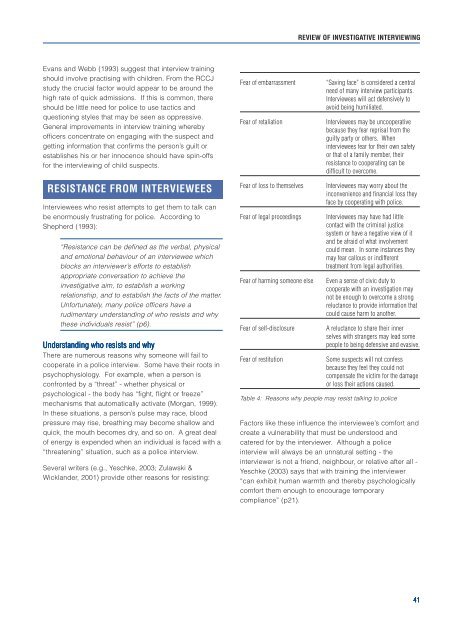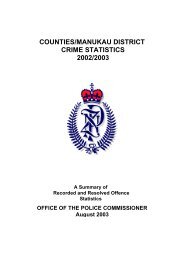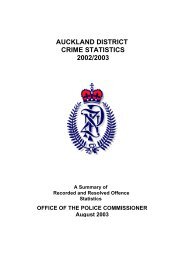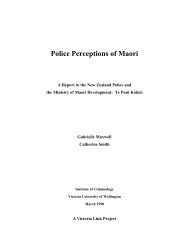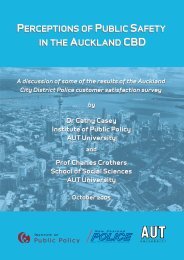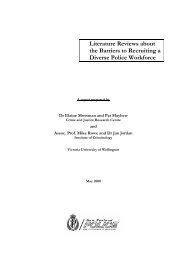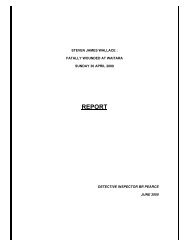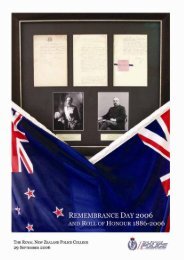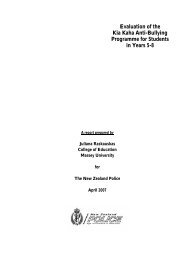Investigative interviewing: the literature - New Zealand Police
Investigative interviewing: the literature - New Zealand Police
Investigative interviewing: the literature - New Zealand Police
You also want an ePaper? Increase the reach of your titles
YUMPU automatically turns print PDFs into web optimized ePapers that Google loves.
REVIEW OF INVESTIGATIVE INTERVIEWING<br />
Evans and Webb (1993) suggest that interview training<br />
should involve practising with children. From <strong>the</strong> RCCJ<br />
study <strong>the</strong> crucial factor would appear to be around <strong>the</strong><br />
high rate of quick admissions. If this is common, <strong>the</strong>re<br />
should be little need for police to use tactics and<br />
questioning styles that may be seen as oppressive.<br />
General improvements in interview training whereby<br />
officers concentrate on engaging with <strong>the</strong> suspect and<br />
getting information that confirms <strong>the</strong> person’s guilt or<br />
establishes his or her innocence should have spin-offs<br />
for <strong>the</strong> <strong>interviewing</strong> of child suspects.<br />
Fear of embarrassment<br />
Fear of retaliation<br />
“Saving face” is considered a central<br />
need of many interview participants.<br />
Interviewees will act defensively to<br />
avoid being humiliated.<br />
Interviewees may be uncooperative<br />
because <strong>the</strong>y fear reprisal from <strong>the</strong><br />
guilty party or o<strong>the</strong>rs. When<br />
interviewees fear for <strong>the</strong>ir own safety<br />
or that of a family member, <strong>the</strong>ir<br />
resistance to cooperating can be<br />
difficult to overcome.<br />
RESISTANCE FROM INTERVIEWEES<br />
Interviewees who resist attempts to get <strong>the</strong>m to talk can<br />
be enormously frustrating for police. According to<br />
Shepherd (1993):<br />
“Resistance can be defined as <strong>the</strong> verbal, physical<br />
and emotional behaviour of an interviewee which<br />
blocks an interviewer’s efforts to establish<br />
appropriate conversation to achieve <strong>the</strong><br />
investigative aim, to establish a working<br />
relationship, and to establish <strong>the</strong> facts of <strong>the</strong> matter.<br />
Unfortunately, many police officers have a<br />
rudimentary understanding of who resists and why<br />
<strong>the</strong>se individuals resist” (p6).<br />
Understanding who resists and why<br />
There are numerous reasons why someone will fail to<br />
cooperate in a police interview. Some have <strong>the</strong>ir roots in<br />
psychophysiology. For example, when a person is<br />
confronted by a “threat” - whe<strong>the</strong>r physical or<br />
psychological - <strong>the</strong> body has “fight, flight or freeze”<br />
mechanisms that automatically activate (Morgan, 1999).<br />
In <strong>the</strong>se situations, a person’s pulse may race, blood<br />
pressure may rise, breathing may become shallow and<br />
quick, <strong>the</strong> mouth becomes dry, and so on. A great deal<br />
of energy is expended when an individual is faced with a<br />
“threatening” situation, such as a police interview.<br />
Several writers (e.g., Yeschke, 2003; Zulawski &<br />
Wicklander, 2001) provide o<strong>the</strong>r reasons for resisting:<br />
Fear of loss to <strong>the</strong>mselves<br />
Fear of legal proceedings<br />
Fear of harming someone else<br />
Fear of self-disclosure<br />
Fear of restitution<br />
Interviewees may worry about <strong>the</strong><br />
inconvenience and financial loss <strong>the</strong>y<br />
face by cooperating with police.<br />
Interviewees may have had little<br />
contact with <strong>the</strong> criminal justice<br />
system or have a negative view of it<br />
and be afraid of what involvement<br />
could mean. In some instances <strong>the</strong>y<br />
may fear callous or indifferent<br />
treatment from legal authorities.<br />
Even a sense of civic duty to<br />
cooperate with an investigation may<br />
not be enough to overcome a strong<br />
reluctance to provide information that<br />
could cause harm to ano<strong>the</strong>r.<br />
A reluctance to share <strong>the</strong>ir inner<br />
selves with strangers may lead some<br />
people to being defensive and evasive.<br />
Some suspects will not confess<br />
because <strong>the</strong>y feel <strong>the</strong>y could not<br />
compensate <strong>the</strong> victim for <strong>the</strong> damage<br />
or loss <strong>the</strong>ir actions caused.<br />
Table 4: Reasons why people may resist talking to police<br />
Factors like <strong>the</strong>se influence <strong>the</strong> interviewee’s comfort and<br />
create a vulnerability that must be understood and<br />
catered for by <strong>the</strong> interviewer. Although a police<br />
interview will always be an unnatural setting - <strong>the</strong><br />
interviewer is not a friend, neighbour, or relative after all -<br />
Yeschke (2003) says that with training <strong>the</strong> interviewer<br />
“can exhibit human warmth and <strong>the</strong>reby psychologically<br />
comfort <strong>the</strong>m enough to encourage temporary<br />
compliance” (p21).<br />
41


